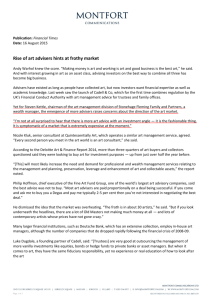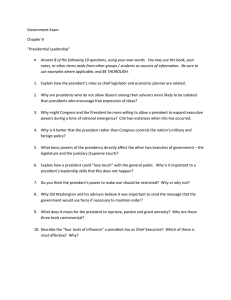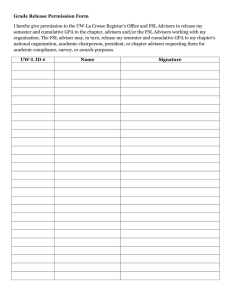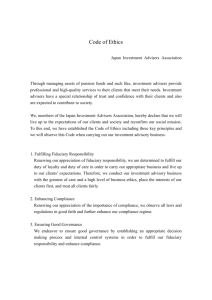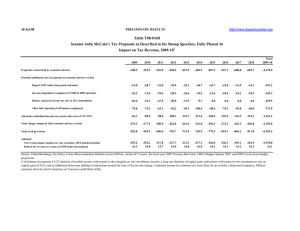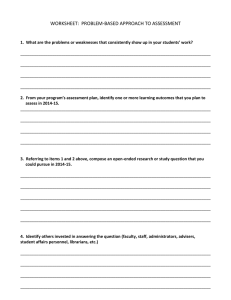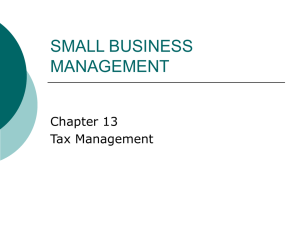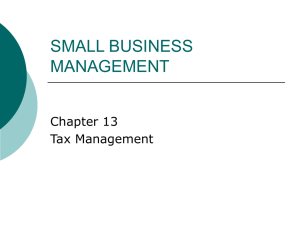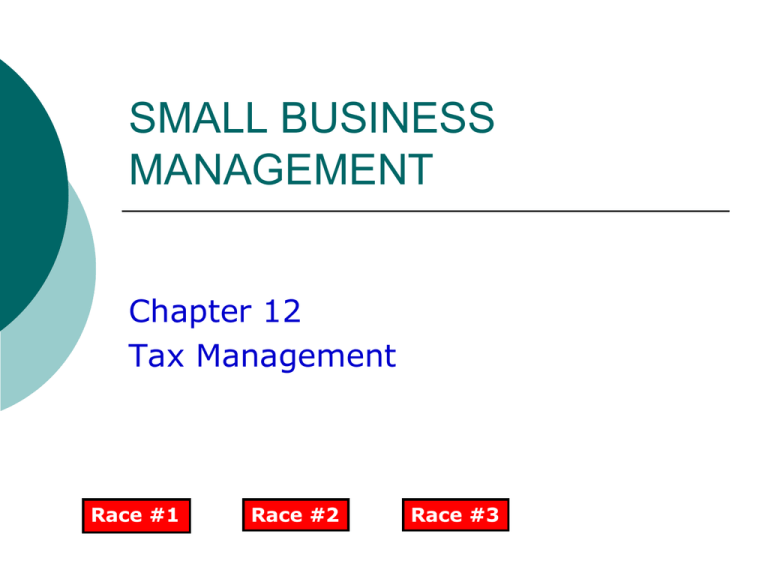
SMALL BUSINESS
MANAGEMENT
Chapter 12
Tax Management
Race #1
Race #2
Race #3
Advisers and Small Business
As entrepreneurs are engaged in
planning and starting their business, they
will often seek out assistance from more
experienced entrepreneurs or mentors
Copyright © 2014 McGraw-Hill Ryerson.
All rights reserved.
Advisers and Small Business
Use of Advisers
Entrepreneur will usually use outside
advisers such as accountants, bankers,
lawyers, advertising agencies, and market
researchers on an as-needed basis
These advisers, who are separate from the
more formal board of advisers, can also
become an important part of the organization
and thus will need to be managed just like
any other permanent part of the new venture
Copyright © 2014 McGraw-Hill Ryerson.
All rights reserved.
Advisers and Small Business
Use of Advisers (cont.)
Mentors
Often the first stage in formal advice is
the use of a mentor
Mentors can be used on an ad hoc basis
or formally assist the entrepreneur in
running the company on an ongoing basis
Board of Advisers
Some entrepreneurs will form a board of
board of advisers occasionally referred to
as a board of directors
Copyright © 2014 McGraw-Hill Ryerson.
All rights reserved.
Taxation and Small Business
History of Taxation
1917 temporary tax
Average Canadian pays 52% of income to
tax
Table 13-3 10% increase needs $100,00
sales
Income Taxes
complexity of principles and frequency
of legislative changes
1. What books and records must be
kept for a business?
Any person carrying on a business must
keep books of accounts and records which
provide the ability to calculate taxes
payable.
Source documents include
invoices for purchases and sales, deposit
slips, cheques, and contracts
For purposes of income tax, many books of
accounts, records, and source documents have
to be retained for a minimum of six years
General Tax Management Principles
Ten fundamental areas
1. Continual tax planning
2. Tax Deferral
Use the tax money during deferral period
Tax laws may change which may reduce tax
liability
3. Income Splitting
through the year requirements
Progressive tax system
4. Marginal Tax Rates
Income and expenses ie 30% = 30 cents on
each dollar
Race #2
General Tax Management Principles (cont.)
5. Deductibles
accounting and legal expenses
Not tax prep or incorporation
Advertising
Canadian Media
business entertaining
automobile expenses
interest expense
Shareholder loan strategy
Repairs - deducted
Improvements - depreciated
office expenses
General Tax Management Principles (cont)
6. Government Tax-Related Programs
Special Tax Rate Deductions
Small Business Deduction (SBD)
Manufacturing and Processing Deduction
12% on 1st $300,000, 22% after
On income not included in sbd
Investment Tax Credit
Deferral Programs
deferred profit sharing – deduct now pay tax later
when paid out
registered retirement savings plan
bonus deferral
General Tax Management Principles
6. Government Tax-Related
Programs (cont.)
Accelerated Capital Cost Allowance
Small Business Financing Programs
7. The Incorporation Question
corporation vs. proprietorship vs.
partnership
General Tax Management Principles (cont)
8. The Remuneration Question
9. Transferring the Business:
Capital Gains
compensation salary or dividend
capital gains and family members
(Chapter 15)
10. Goods and Service Tax (GST)
and Provincial Sales Tax (PST)
Race # 3
Appendices
A. Federal and Provincial Tax Rates
for Individuals
B. Tax Reference Tables

